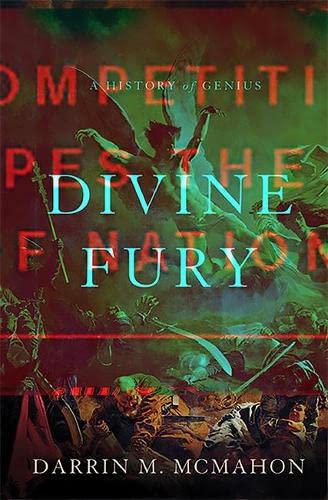
Divine Fury: A History of Genius, Basic Books, 2013
Learn More…Selected Comments and Reviews
“[An] erudite and engaging history of genius…McMahon is refreshingly unafraid to embrace the mythic dimension of his subject as part of its true importance, an approach that offers to deepen, not undermine, our appreciation of genius.” —The New York Times
“A deeply researched history of the idea of genius in the Western world.” —The Wall Street Journal
“An engaging survey of the history of genius in European culture…McMahon tells the history of genius with verve, wit and insight, and his book is a pleasure to read. Divine Fury makes innumerable fascinating connections and weaves many threads into a coherent narrative spanning 2,500 years. No theoretical statement could vindicate a revived history of ideas so well as this exemplary work…a superb book that judiciously blends celebrations of genius with cautionary tales.”—Nation
“There have been many studies of the idea of genius, but a signal virtue of this new account is its comprehensiveness. Rather than start in the 18th century, when the modern idea of genius emerged-as an exceptional quality located not in God but in man-or with the 19th-century Romantic poets’ exaltation of genius as a kind of ‘divine fury’, McMahon . . . begins with the ancients, contrasting the Roman notion of ingenium with varied interpretations of genius in modern times. Crucial to the change in meaning of the term was ‘the waning of mimetic aesthetics,’ the idea that art was imitation rather than creation. Uniqueness and creativity became the hallmarks of genius from the 18th century on: ‘The man of genius has a way of seeing, of feeling, of thinking,’ wrote Diderot, ‘unique to him alone.’ McMahon concludes by examining the not always happy fate of the idea in our times. VERDICT This exceptional intellectual history is too densely written to appeal to the casual reader, but it’s a gem of a book to be widely read by scholars in many fields, not just in the history of ideas.” —David Keymer, Library Journal more comments and reviews
Book Reviews
- The New York Review of Books, Tamsin Shaw
- The New York Times, James Ryerson.
- The Wall Street Journal, Eric Felten.
- The Nation, Warren Breckman.
- Buffalo News, Jack Quinan.
- The Globe and Mail, Peter Scowen.
- The Daily Beast, Nick Romeo.
- Brain Pickings, Maria Popova.
- Commentary Magazine, Joseph Epstein.